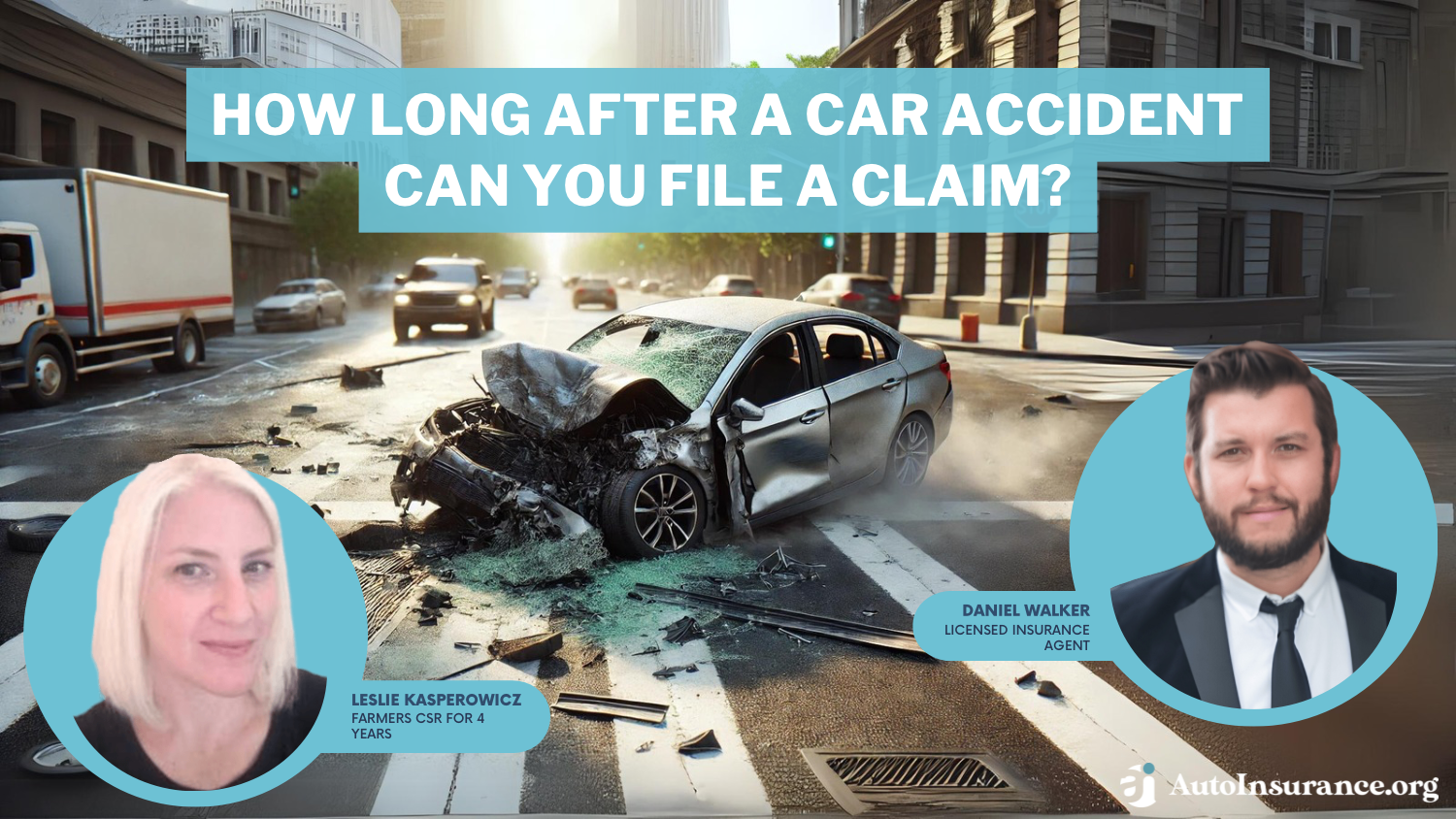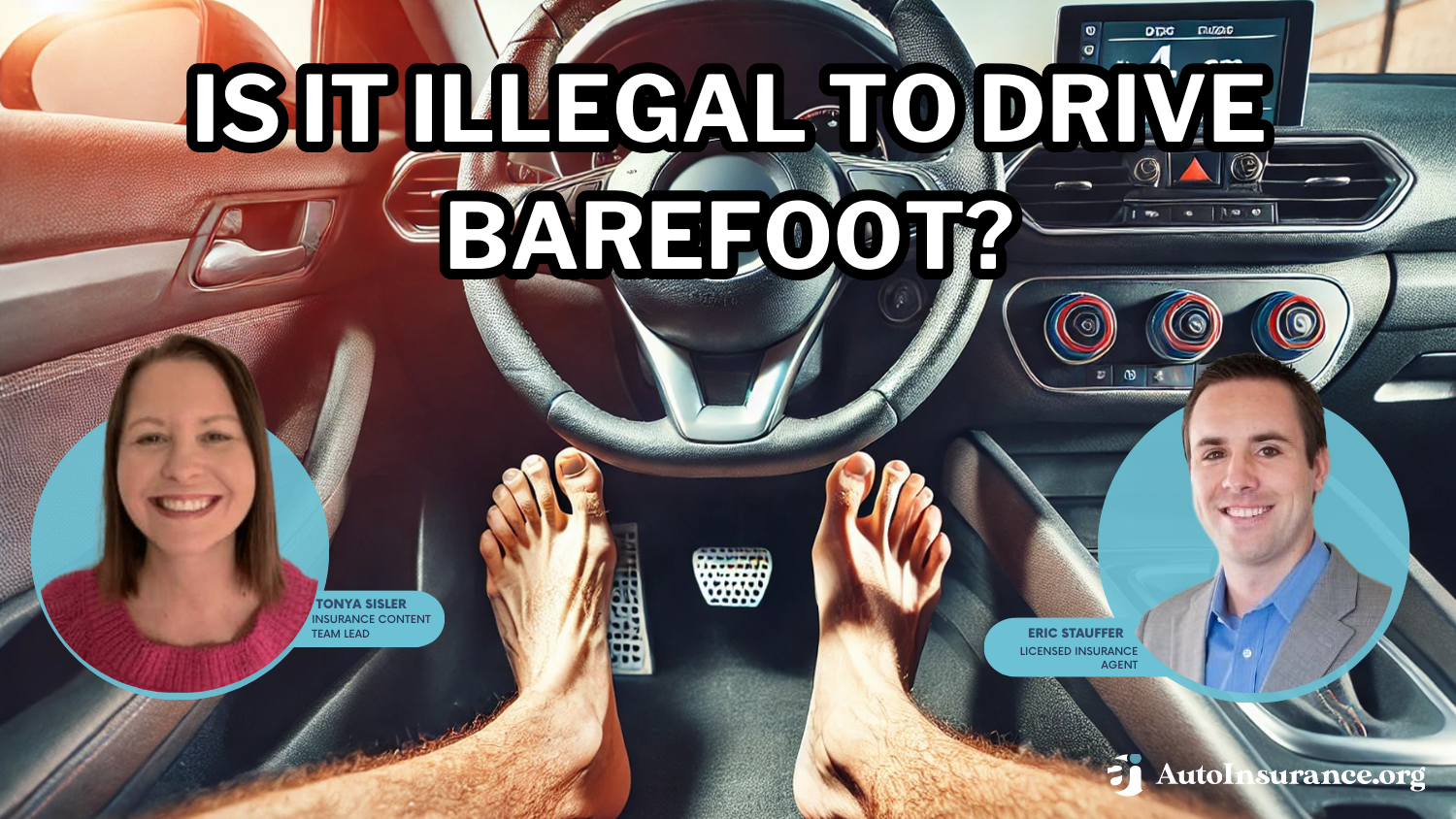How long after a car accident can you file a claim?
How long you have to file an insurance claim depends on your state laws. Your best bet is to call the police and file a report, then get in touch with your insurance company immediately.
Read more Secured with SHA-256 Encryption




Table of Contents
Table of Contents


Farmers CSR for 4 Years
Leslie Kasperowicz holds a BA in Social Sciences from the University of Winnipeg. She spent several years as a Farmers Insurance CSR, gaining a solid understanding of insurance products including home, life, auto, and commercial and working directly with insurance customers to understand their needs. She has since used that knowledge in her more than ten years as a writer, largely in the insuranc...
Leslie Kasperowicz


Licensed Auto Insurance Agent
Daniel Walker graduated with a BS in Administrative Management in 2005 and has run his family’s insurance agency, FCI Agency, for over 15 years (BBB A+). He is licensed as an insurance agent to write property and casualty insurance, including home, life, auto, umbrella, and dwelling fire insurance. He’s also been featured on sites like Reviews.com and Safeco. To ensure our content is accura...
Daniel Walker
Updated December 2024
Insurance companies generally encourage you to contact them immediately if you’ve been in a car accident. They may see a delay in reporting an accident as grounds to deny a potential claim, or they may feel the need to investigate further under suspicion of fraud.

States have different deadlines for filing claims after an accident has been reported. The statute of limitations in most jurisdictions is two to three years, but in some areas, you have up to ten years to pursue a claim.
Auto insurance companies often demand that you report an accident as quickly as possible — typically within 30 days. Doing so, however, is not the same as making a claim. Although it’s ideal to file a claim as quickly as possible, some damage or health difficulties may not become apparent for some time after the event.
Keep reading to learn what to do after a car accident and how long after the accident you have to file a claim in your state.
- Most drivers will get into a car accident eventually
- Knowing what to do and meeting deadlines for reporting a car wreck can mean the difference between receiving compensation or having your claim denied
- While most states expect you to report the accident immediately, filing a lawsuit for personal injury or property damage has different time requirements
How long do you have to file an insurance claim after an accident?
Usually, as long as you contact your insurance company within a day, you’ll be fine.
California and Texas offer up to 10 days to report an accident, while Ohio gives you six months. Other states like Virginia and Hawaii require you to report it as soon as possible.
How long do you have to file an insurance claim? Let’s look at the table below to find out.
Filing a Car Insurance Claim Overview
| Topic | Details | From Experts.. |
|---|---|---|
| What states are at-fault? | Most states are at-fault, with the exception of Florida, Hawaii, Kansas, Kentucky, Massachusetts, Michigan, Minnesota, New Jersey, New York, North Dakota, Pennsylvania and Utah. | Insurance Information Institute |
| How long do I have to file a claim? | The statute of limitations is 2 years and up to 6 years in some states. | Find Law |
| What is my deductible? | Most common deductibles for car insurance are $250, $500, and $1,000. | Insurance Information Institute |
| Do I need to file a claim for a minor accident? | You need to file if someone/someone else's property is damaged. You can also pay for minor car repairs out-of-pocket. | Find Law |
However, the requirements and timeline for filing a claim and lawsuit are different.
How much time do you have to file a lawsuit after an accident?
Again, time limits for bringing claims for property damage and bodily harm vary by state. On average, most states have a statute of limitations that allows you to file a lawsuit against someone for a car accident for up to two or three years.
This table shows long you have to file a lawsuit after an auto accident in your state:
Statute of Limitations for Filing an Insurance Claim by State
| State | Personal Injury Statute of Limitations for Filing an Insurance Claim | Property Damage Statute of Limitations for Filing an Insurance Claim |
|---|---|---|
| Alabama | 2 years | 2 years |
| Alaska | 2 years | 6 years |
| Arizona | 2 years | 2 years |
| Arkansas | 3 years | 3 years |
| California | 2 years | 3 years |
| Colorado | 3 years | 3 years |
| Connecticut | 2 years | 3 years |
| Delaware | 2 years | 2 years |
| Florida | 4 years | 4 years |
| Georgia | 2 years | 4 years |
| Hawaii | 2 years | 2 years |
| Idaho | 2 years | 3 years |
| Illinois | 2-3 years | 5 years |
| Indiana | 2 years | 2 years |
| Iowa | 2 years | 5 years |
| Kansas | 1 year | 2 years |
| Kentucky | 1 year | 2 years |
| Louisiana | 1 year | 1 year |
| Maine | 6 years | 6 years |
| Maryland | 3 years | 3 years |
| Massachusetts | 3 years | 3 years |
| Michigan | 3 years | 3 years |
| Minnesota | 2 years | 6 years |
| Mississippi | 3 years | 3 years |
| Missouri | 5 years | 5 years |
| Montana | 3 years | 2 years |
| Nebraska | 4 years | 4 years |
| Nevada | 2 years | 3 years |
| New Hampshire | 3 years | 3 years |
| New Jersey | 2 years | 6 years |
| New Mexico | 3 years | 4 years |
| New York | 3 years | 3 years |
| North Carolina | 3 years | 3 years |
| North Dakota | 6 years | 6 years |
| Ohio | 2 years | 2 years |
| Oklahoma | 2 years | 2 years |
| Oregon | 2 years | 6 years |
| Pennsylvania | 2 years | 2 years |
| Rhode Island | 3 years | 10 years |
| South Carolina | 3 years | 3 years |
| South Dakota | 3 years | 6 years |
| Tennessee | 1 year | 3 years |
| Texas | 2 years | 2 years |
| Utah | 4 years | 3 years |
| Vermont | 3 years | 3 years |
| Virginia | 2 years | 5 years |
| Washington | 3 years | 3 years |
| Washington D.C. | 3 years | 3 years |
| West Virginia | 2 years | 2 years |
| Wisconsin | 3 years | 3 years |
| Wyoming | 4 years | 4 years |
Kentucky, Louisiana, and Tennessee only allow a year to file a personal injury suit, while Maine allows up to six years for both personal injury and property damage lawsuits.
Any time after the date of the injury and before the statute of limitations has run out, a lawsuit may be brought. This is especially so considering that some damages, from vehicle to medical issues, may take time to manifest. As such, the window to file a claim is greater once the accident is reported to cover this scenario.
Still, to protect yourself, you should report the accident to the police. You will often need the information in the police report if you intend to sue your auto insurance company for failure to pay out based on a faulty investigation or general unwillingness to pay.
Free Insurance Comparison
Compare Quotes From Top Companies and Save
Secured with SHA-256 Encryption
When Not to Submit a Claim for Auto Insurance
If you have liability insurance and your automobile is totaled, you cannot file a claim with your insurance company. You must carry full coverage car insurance for companies to pay out on a total loss.
However, you can file a claim with the other driver if they are found at fault for the accident.
Other instances when you may not submit a claim for car insurance include:
- Minor dents and scratches that cost less than your deductible to repair
- Minor collisions not involving other drivers, such as hitting your own mailbox
In general, if you can afford to pay for the repairs yourself, and the collision did not involve any other drivers, pedestrians, or someone else’s property, you don’t have to file a claim with your insurer.
If you don’t report an automobile collision, what happens?
It all depends on the circumstance, but if you are at fault for hitting someone else and driving off, you could face jail time. In some areas, such as California, failing to report an automobile collision that causes more than $1,000 in property damage, injuries, or fatalities is against the law.
Technically, you’re required to report every accident to your auto insurance company. But if you ran into a guardrail or backed into your garage and the total cost is less than your deductible, you might pay out of pocket to avoid your rates going up during the renewal period.
Many consumers are reluctant to report minor incidents for fear of their rates going up. However, unless you bring your car to a mechanic, you won’t know the full amount of the damage. Even though it might only look like the bumper was scraped, a fender accident could harm your axles and other parts.
To improve your chances of having damages and injuries covered, you should always report the occurrence to the police and your insurance company as soon as possible.
If you don’t notify your insurance provider, you might have to pay for those unpleasant surprises with your own cash. If the other driver is at fault, they can try to persuade you to settle the accident without notifying your insurance company. However, you must consider your own well-being and financial future.
How long will it take for a claim to pay out?
An automobile insurance claim can take several months or just a few weeks, depending on your insurer, the state, and the nature of the claim. Payment of claims may be postponed for several reasons. Unfortunately, some of these circumstances are out of your control.
The following are a few of the main causes:
- The settlement process will take longer if a driver is seriously hurt in a car accident. Their medical treatment must be completed to determine how much money the driver can receive.
- Dispute over who caused the accident. When it’s not immediately obvious who was at fault, the insurance companies will take longer to resolve the claim.
- Back-and-forth discussions. In general, settlement talks might continue for a long time. There is frequently a lot of back and forth between attorneys, victims, and auto insurance firms.
This is why it’s vital to call the police after an auto accident. If you are in an accident and don’t call the police, then there’s no formal report to confirm the specifics of the occurrence. Your claim can be rejected if the claim adjuster can’t determine what happened and who was at fault using other evidence.
What is Progressive’s claim time limit?
According to their website, Progressive auto insurance will offer you a claim settlement within 7 – 14 days.
However, the insurance company typically has 30 days to look into your auto insurance claim, and many people report difficulty receiving payment for an injury claim in a process known as “lowballing.”
In this same vein, Progressive scored well below average for claims satisfaction. Customers report better and faster claims handling with Allstate, Farmers, and State Farm.
What to Do After You’ve Been in a Car Accident
The first thing you should do after an accident is confirm that you, your passengers, and anyone else involved are not injured. Then, follow the steps below:
- Call 911. The sooner the police can document the accident and provide a report, the more likely you’ll have a smooth claims process.
- Document everything. The more details, the better. Take pictures, get contact and insurance information from the other driver, and locate any witnesses or nearby cameras that might have recorded the event.
- Speak with your auto insurer. You’ve got nothing to hide, so you will want to let them know immediately. Waiting unnecessarily longer might trigger an insurance fraud warning, or they may deny you outright.
- Speak with your claims assessor. Your insurance company will assign a claims handler or adjustor to investigate the accident, confirm the responsible party, and then determine the payout amount.
You will want to keep copies of everything, from photos to repair receipts from the mechanic. Every piece of critical information may eventually help you get a fair shake in the claims process. It will also come in handy should you need to seek an attorney.
Free Insurance Comparison
Compare Quotes From Top Companies and Save
Secured with SHA-256 Encryption
The Bottom Line on Filing a Claim After a Car Accident
The faster you report the accident and file a claim, the faster your claim process will be, and the less likely the insurance company will be to deny your claim.
You typically have up to 30 days to report an accident and file a claim, but state insurance laws will dictate exactly how long you have. Drivers in California, for instance, have two years and three years, respectively, to bring a claim for bodily harm and property damage.
Filing a lawsuit after an accident is subject to a different timeline based on the injuries and extent of the damage. Speak with an experienced car accident attorney to learn how to sue another driver after an accident.

Frequently Asked Questions
How soon after an accident must a lawsuit be filed?
The time frame for filing a lawsuit following an accident varies by state. The time period also depends on the kind of damage, but most jurisdictions generally allow drivers between one and ten years to bring a case.
How much time do you have to go to a hospital following a vehicle accident?
You should go to the hospital immediately if you’ve been hurt in an accident. However, if your injuries are less obvious, you may wait up to two weeks and still be eligible for insurance payment.
Who pays for my medical bills if I have a vehicle accident?
No matter who was at blame for the accident, your insurance would pay for your own medical bills in a no-fault state.
However, suppose you do not reside in one of the 12 no-fault states. In that case, you should submit a third-party claim with the insurance provider of the at-fault motorist, and their liability coverage will pay out to cover the expenses of your injuries.
What if I discover injuries or damages after the accident? Can I still file a claim?
Yes, you can still file a claim even if you discover injuries or damages after the car accident. It’s important to notify your insurance company immediately after becoming aware of any injuries or damages, regardless of how much time has passed since the incident. However, it’s advisable to inform them as soon as possible to avoid any potential complications and ensure a smooth claims process.
Are there any specific deadlines for filing a car accident insurance claim?
The specific deadlines for filing a car accident insurance claim can vary depending on the insurance company and the policy you have. It is crucial to review your insurance policy carefully to determine any time limits or deadlines for reporting accidents and filing claims. Some insurance policies may have strict timelines, such as requiring notification within a certain number of days after the accident. Failure to meet these deadlines could result in denial of coverage, so it’s important to be aware of and adhere to any specified timelines.
Can I still file a claim if the accident was not my fault?
Yes, you can still file a claim even if the car accident was not your fault. In such cases, you would typically file a claim with the at-fault driver’s insurance company. It’s important to gather all relevant information, such as the other driver’s contact and insurance details, and provide this information to your insurance company when filing the claim. Your insurance company can guide you through the process and help you navigate any potential subrogation (recovery) processes
What happens if I don’t report the accident to my insurance company within the recommended time frame?
Failing to report the accident to your insurance company within the recommended time frame specified in your policy may result in complications. Insurance policies often contain provisions requiring prompt reporting of accidents to allow for timely investigations and assessments. If you delay reporting, it may give the insurance company grounds to deny coverage or question the validity of your claim. To avoid potential issues, it is best to inform your insurance company promptly after a car accident.
Can I file a claim if I don’t have collision coverage?
If you don’t have collision coverage, your insurance policy may not provide coverage for the damages to your own vehicle. However, you may still be eligible to file a claim for injuries or damages caused by another party if they are at fault. This type of claim would typically be filed against the at-fault driver’s liability insurance. It’s important to review your policy and consult with your insurance company to understand the specific coverage and options available to you.
Get a FREE Quote in Minutes
Insurance rates change constantly — we help you stay ahead by making it easy to compare top options and save.






